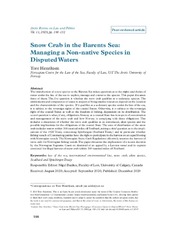| dc.contributor.author | Henriksen, Tore | |
| dc.date.accessioned | 2020-12-21T07:23:45Z | |
| dc.date.available | 2020-12-21T07:23:45Z | |
| dc.date.issued | 2020-12-09 | |
| dc.description.abstract | The introduction of a new species to the Barents Sea raises questions as to the rights and duties of states under the law of the sea to exploit, manage and conserve the species. This paper discusses three of them. The first question is whether the snow crab qualifies as a sedentary species. The entitlements and competence of states in respect of living marine resources depend on the location and the characteristics of the species. If it qualifies as a sedentary species under the law of the sea, it is subject to the sovereign rights of the coastal States. Otherwise, it is subject to the sovereign right of the coastal States as well as the freedom of fishing, dependent on its distribution. The second question is what, if any, obligations Norway as a coastal State has in respect of conservation and management of the snow crab and how Norway is complying with these obligations. This includes a discussion of whether the snow crab qualifies as an introduced, alien species and the possible implications for the obligations of the coastal State. The area of distribution of the snow crab includes waters within 200 nautical miles off Svalbard, raising a third question as to the implications of the 1920 Treaty concerning Spitsbergen (Svalbard Treaty) and in particular whether fishing vessels of Contracting parties have the right to participate in the harvest on an equal footing with Norwegian vessels. The Norwegian Snow Crab Regulations effectively reserves the harvest of snow crab for Norwegian fishing vessels. The paper discusses the implications of a recent decision by the Norwegian Supreme Court on dismissal of an appeal by a Latvian vessel and its captain convicted for illegal harvest of snow crab within 200 nautical miles off Svalbard. | en_US |
| dc.identifier.citation | Henriksen T. Snow Crab in the Barents Sea: Managing a Non-native Species in Disputed Waters . Arctic Review on Law and Politics. 2020;11:108-132 | en_US |
| dc.identifier.cristinID | FRIDAID 1858044 | |
| dc.identifier.doi | https://doi.org/10.23865/arctic.v11.2545 | |
| dc.identifier.issn | 1891-6252 | |
| dc.identifier.issn | 2387-4562 | |
| dc.identifier.uri | https://hdl.handle.net/10037/20101 | |
| dc.language.iso | eng | en_US |
| dc.publisher | Nordic Open Access Scholarly Publishing | en_US |
| dc.relation.journal | Arctic Review on Law and Politics | |
| dc.relation.uri | https://arcticreview.no/index.php/arctic/article/view/2545?utm_medium=email&utm_campaign=Arctic%20Review%2009122020&utm_content=Arctic%20Review%2009122020+CID_caa71650446bb344ee11f672606d8c65&utm_sour | |
| dc.rights.accessRights | openAccess | en_US |
| dc.rights.holder | Copyright 2020 The Author(s) | en_US |
| dc.subject | VDP::Social science: 200::Law: 340::Fishery law: 348 | en_US |
| dc.subject | VDP::Samfunnsvitenskap: 200::Rettsvitenskap: 340::Fiskerirett: 348 | en_US |
| dc.title | Snow Crab in the Barents Sea: Managing a Non-native Species in Disputed Waters | en_US |
| dc.type.version | publishedVersion | en_US |
| dc.type | Journal article | en_US |
| dc.type | Tidsskriftartikkel | en_US |
| dc.type | Peer reviewed | en_US |


 English
English norsk
norsk